Public Policy
Senator Ron Wyden Talks Infrastructure at Town Hall
Oregon Senator Ron Wyden held a press conference on Thursday, February 1, 2018, about the dire need for federal funding to fix roads and bridges not only in Oregon, but across the United States.
The press conference took place at the Marquam Bridge, one of the bridges in Multnomah County in need of structural reinforcement in the case of a seismic event. Nearly all of Oregon’s major construction unions were represented at the event, as well as Oregon Tradeswomen’s Executive Director, Kelly Kupcak.
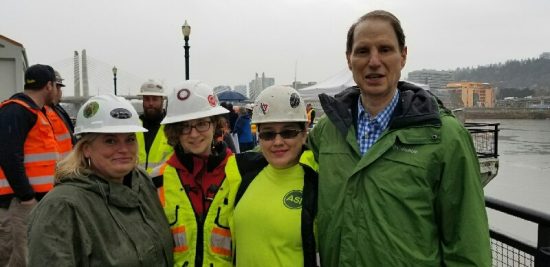
Pictured from Left: Kelly Kupcak (Oregon Tradeswomen), Nicole Rappaport (Local 701), AJ Banuelos (Local 737), and U.S. Senator Ron Wyden
Senator Wyden addressed President Trump’s purported intention to raise $1.5 trillion to fix our nation’s failing infrastructure. Senator Wyden said, “The way you improve bridges and roads and do all the great work these people do is with real federal dollars… We still haven’t heard from the president and the Republicans how that’s going to happen.”
Sources from the Trump administration claim that only $200 billion would come from the federal government, putting the pressure on state and local governments to raise the rest of the money. Since 2003, the Oregon Department of Transportation (ODOT) has been making major efforts to fix Oregon’s bridges and even with the $5.2 billion plan approved by state legislature in 2017 to invest in our infrastructure, federal aid is needed to truly strengthen our roads and bridges to the extent needed.
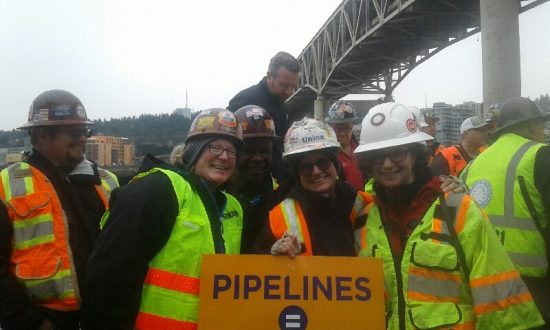
In 2009, Senator Wyden authored the bi-partisan Build America bonds program that successfully generated $181 billion for public works projects and created 3,500 jobs in Oregon. Now, the Senator is calling on the current administration to help fund the rebuilding of the nation’s infrastructure by endorsing a plan to use some of the $2.6 trillion coming back into America’s economy as a result of the tax cuts implemented in December 2017.
Investing in infrastructure not only improves our local and national economy by creating jobs and reliable mobility for people and businesses, but it is also a critical issue of public safety. We applaud Senator Wyden for his efforts in making sure that funding to maintain a strong infrastructure for our country is a priority for our government.
2017 Construction Equity Day
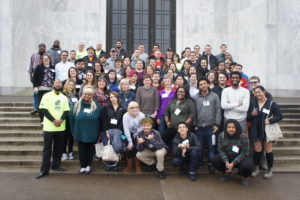
On February 23rd, staff and students from Oregon Tradeswomen, Inc., Portland Youth Builders, and Constructing Hope bused down to the State Capitol in Salem, OR for Construction Equity Day! This group of 80 people spent their day educating State Legislators about the importance of pre-apprenticeship programs and advocating for their continued funding. Measure 98, which promotes Career and Technical Education (CTE) and SB 292/HB 2167, which focuses on reducing bullying and harassment in the workplace, were also a major focus of advocacy efforts. Students had more than 20 scheduled meetings with legislators and navigated them with confidence; sharing their personal stories about how the trades industry has changed their lives. Some highlights for students included listening to a speech from Tim Frew, the Executive Secretary of the Oregon Building and Construction Trades Council, and meeting with Tina Kotek, Speaker of the House as well as Democratic Representative, Tawna Sanchez.
We at OTI are so proud of our Trades and Apprenticeship Career Class (TACC) students. They, along with the other students in attendance, led with power and demonstrated how to use their “construction voices” to advocate for the necessity of creating a more diverse workforce. The success of the day is truly owed to them! Special thanks to Alice Bartlett from the League of Women Voters for speaking with students about the importance of lobbying and legislation and to the Multnomah County Bar Foundation for providing the funding to make this event possible.
We would also like to thank our four legislative meeting leaders who just graduated from the most recent Trades and Apprenticeship Career Class. These students spent time preparing for this day and led their peers in developing their stories and meeting with Legislators – Nora Aguilar, Freedom Moreno, Nora Sackett, and Sumer Smith.
Community Event: An Oregon Agenda for Racial, Gender, and Economic Justice
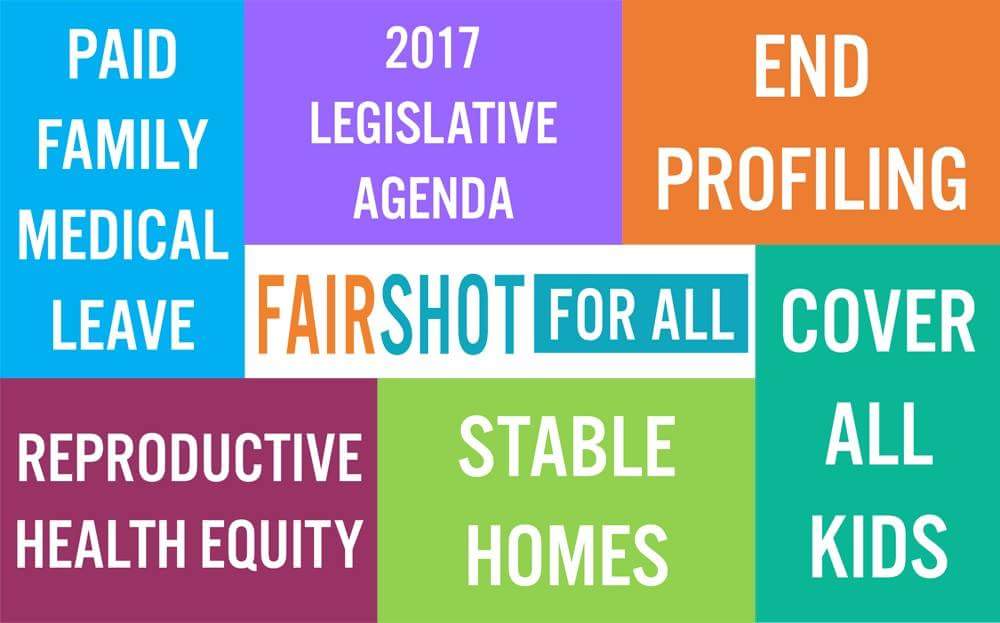
OTI staff members Emma Brennan and Brynn Hall attended the Oregon Agenda for Racial, Gender, and Economic Justice on December 1st. The event was held at the historic First Baptist Church on Vancouver Avenue and was put on by Oregon’s Fair Shot for All Coalition and the Oregon Health Equity Alliance (OHEA) with the goal of reaffirming our community’s commitment to racial and economic justice.
Amidst the political turmoil our country is facing during the post-election season, Kathy Wai of the Asian Pacific American Network of Oregon urged audience members to continue the fight for equality stating that “our resistance and solidarity is crucial” during this time. Further powerful speeches were heard from Amira Streeter of the Urban League of Portland, Nancy Haque of Basic Rights Oregon, and Tom Chamberlain of the Oregon AFL-CIO.
A bold 2017 legislative agenda was announced with the hopes that Oregon can continue to lead the country in it’s fight for racial, gender, and economic justice for all Oregonians.
- Cover all Kids promises insurance coverage for all Oregon children so they can thrive in school and start on a pathway to success in their lives.
- End Profiling aims change the culture of policing in Oregon to make neighborhoods safer and communities stronger by funding and creating the system needed to identify patterns of profiling and enacting accountability mechanisms to address profiling when it occurs.
- Paid Family Medical Leave will ensure that Oregonians can welcome a new child or take care of their own or their family member’s serious health needs without losing the income their family relies on.
- Reproductive Health Equity will ensure that preventative reproductive health coverage is available at zero out of pocket cost for the people who have been categorically excluded from health programs due to citizenship status and/or gender expression.
- Stable Homes for Oregon Families will prevent no-cause evictions and repeal the ban on rent stabilization in order to help working families maintain housing stability and curb homelessness.
It was inspiring to see the community come together to fight for racial, gender, and economic equity and it is our belief that this legislative agenda will positively affect tradeswomen and their families. Visit the Fair Shot for All website for more information about how to get involved to make Oregon a state where everyone has opportunity.
Rock against the TPP
 Fight for the Future, Firebrand Records, Rage Against the Machine guitarist Tom Morello, and a large coalition of labor, environmental, and social justice groups are organizing Rock Against the TPP, a nationwide series of large-scale educational concert events to raise awareness about the dangers of this agreement.
Fight for the Future, Firebrand Records, Rage Against the Machine guitarist Tom Morello, and a large coalition of labor, environmental, and social justice groups are organizing Rock Against the TPP, a nationwide series of large-scale educational concert events to raise awareness about the dangers of this agreement.
The tour will be in Portland, OR on August 20th at Director Park with a concert featuring popular punk band Anti-Flag, Golden Globe nominated actress Evangeline Lilly, bilingual dance-rock band Downtown Boys, Shihasin of the Navajo Nation, Afro-Latin reggae vocalist Taina Asili, and more. There will also be a teach-in before the concert and Evangeline Lilly will host a training on How to Fight the TPP on Sunday, August 21st at 1pm at the First Unitarian Church. All events are free, all ages, and wheelchair accessible.
As you likely know, the TPP is a massive trade deal (like NAFTA) that was negotiated in complete secrecy with hundreds of lobbyists from large corporations setting the agenda. It poses a serious threat to our basic democratic process as well as jobs, the environment, internet freedom, human rights, food safety, and more.
Visit Rock Against the TPP for more information.
OTI Endorses Ballot Measure 98
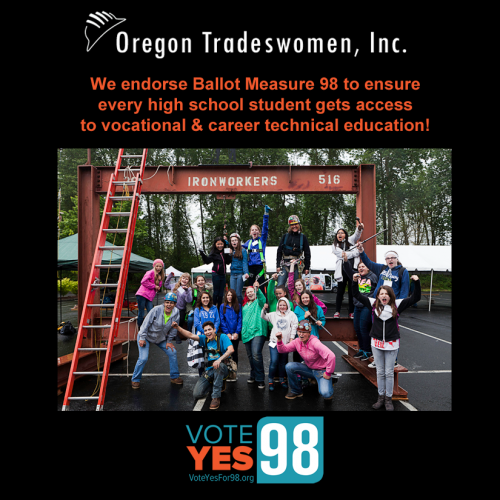
Every year, at least 10,000 Oregon high school students don’t graduate. Many of those who drop out simply lose interest and disengage. After years of repeated budget cuts to our high schools, many critical learning opportunities have been taken away from Oregon students. Ballot Measure 98 would change that by restoring and expanding vocational and career technical education (CTE), college preparation courses, and Advanced Placement classes in all high schools.
This is an important step for Oregon businesses, too, as many employers in construction, manufacturing, engineering, and computer coding are currently having difficulty local skilled workers, and the situation is only going to intensify as the skilled workforce in these industries approach retirement.
Learn more at VoteYesFor98.org
Narrowing the Wage Gap

New Website and Report Explores How Improving Women’s Access to Middle-Skill Jobs Can Narrow the Wage Gap while Filling a Skills Gap in Growing Sectors
Studies show that half of the gender wage gap is due to women working in different occupations and sectors than men. Improving women’s access to good middle-skill jobs can help close the wage gap and improve women’s economic security.
The new Pathways to Equity Initiative from the Institute for Women’s Policy Research (IWPR) shows careers that can improve women’s economic standing and meet employers’ demands for skilled workers. IWPR launched a new interactive website, womenandgoodjobs.org, which helps users identify pools of skilled women workers who could be tapped to fill shortages, ensuring that the economy benefits from the talent of its whole workforce. Read the Initiative’s research findings and explore the site at womenandgoodjobs.org.
Harassment in the Workplace
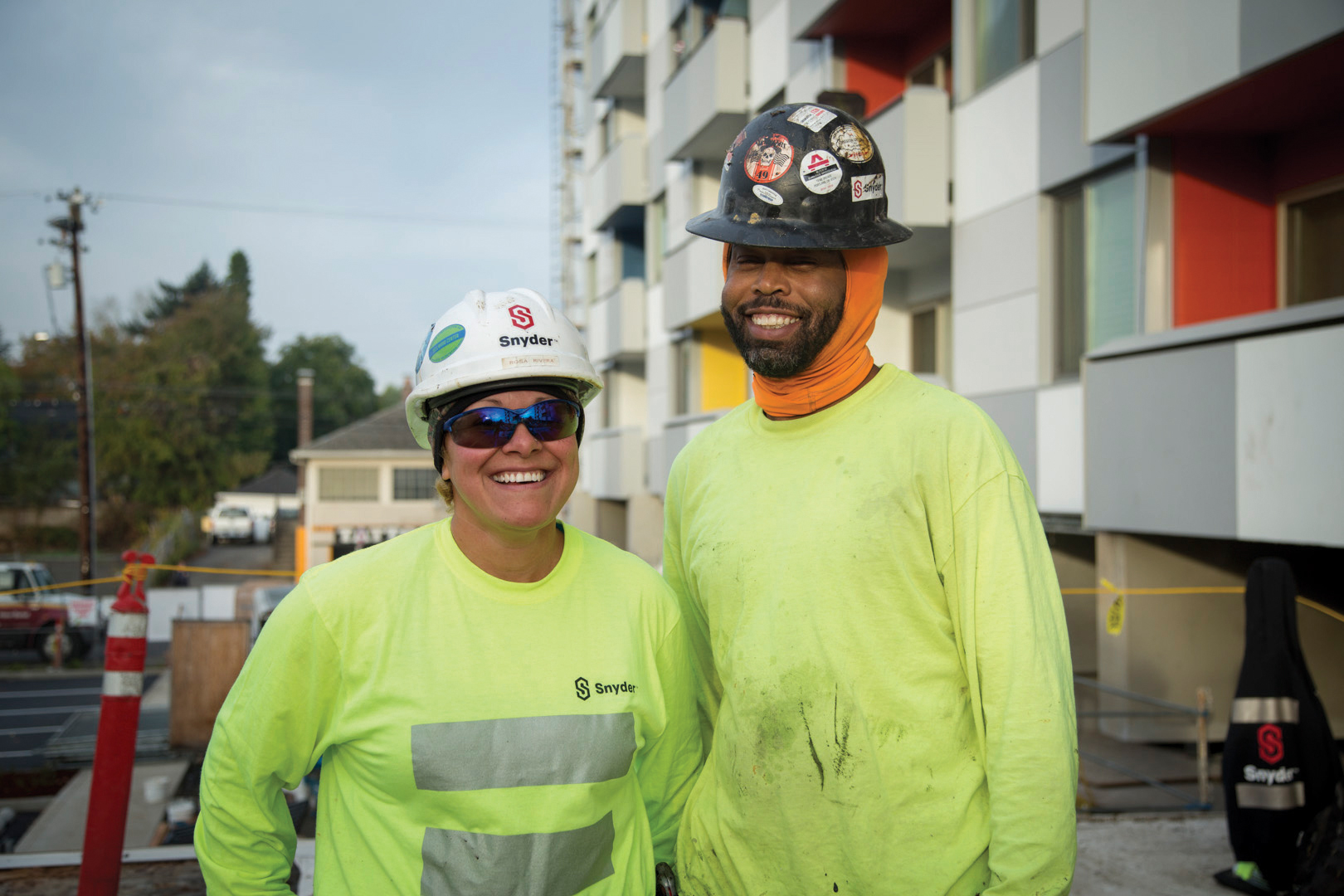
In June, the Equal Employment Opportunity Commission (EEOC) released the 2016 EEOC Harassment in the Workplace Report. OTI was pleasantly surprised to see that the report took a much broader and more comprehensive view of this issue rather than sticking to a strict legal definition.
The report acknowledges that the vast majority of workers who experience harassment in the workplace are unlikely to report the behaviors. Given this information, the EEOC is recommending prevention efforts to address workplace harassment as a remedy instead of simply focusing on the report process.
There is a section in the report that recommends the use of Bystander Intervention Training as an effective prevention model, with the caveat that more research needs to be conducted to determine the effectiveness of such models. Interestingly, OTI has been working on exactly that approach! For the last two years, OTI has been working with Green Dot (mentioned on page 57 of the report) to get funding for a pilot project here in Oregon. We are really excited that the first training for the Respectful Workplaces project will take place at the end of August!
If you are interested in this topic, but only have a few minutes, please read the summary (pages 66 – 71)! If you have more time, we recommend reading the entire report.
Narrowing the Gender Wage Gap – New Report
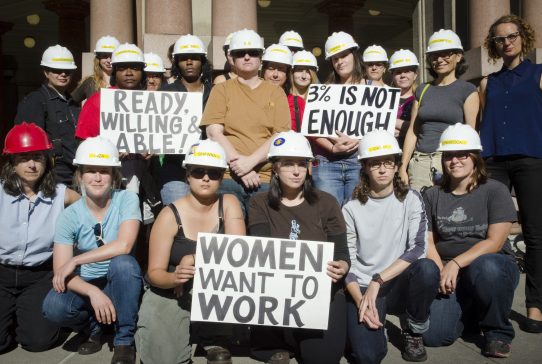
New Website and Report Explores How Improving Women’s Access to Middle-Skill Jobs Can Narrow the Wage Gap while Filling a Skills Gap in Growing Sectors
Studies show that half of the gender wage gap is due to women working in different occupations and sectors than men. As such, improving women’s access to good middle-skill jobs can help close the wage gap and improve women’s economic security.
The new Pathways to Equity Initiative from the Institute for Women’s Policy Research (IWPR) shows careers that can improve women’s economic standing and meet employers’ demands for skilled workers. IWPR launched a new interactive website, womenandgoodjobs.org, which helps users identify pools of skilled women workers who could be tapped to fill shortages, ensuring that the economy benefits from the talent of its whole workforce.
Read the Initiative’s research findings and explore the site at womenandgoodjobs.org.
OTI at the United State of Women Summit
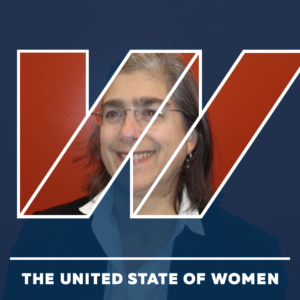 We are so proud to represent tradeswomen at the United State of Women Summit happening in Washington, DC starting June 14, 2016. The summit is a collaboration of the White House Council on Women and Girls, the Department of Labor, the Aspen Institute, and Civic Nation. The Summit is a convening of women leaders who will together work to address gender equity in the areas of health and wellness, educational opportunity, violence against women, entrepreneurship and innovation, leadership and civic engagement, and economic opportunity.
We are so proud to represent tradeswomen at the United State of Women Summit happening in Washington, DC starting June 14, 2016. The summit is a collaboration of the White House Council on Women and Girls, the Department of Labor, the Aspen Institute, and Civic Nation. The Summit is a convening of women leaders who will together work to address gender equity in the areas of health and wellness, educational opportunity, violence against women, entrepreneurship and innovation, leadership and civic engagement, and economic opportunity.
OTI’s Executive Director, Connie Ashbrook, will join a delegation of 35 tradeswomen from around the country, along with First Lady Michelle Obama, Tina Fey, Oprah, and thousands of other women all working toward lifting up women and our nation. Watch the live stream Tuesday, June 14th, 2016 if you’d like to take it in!
While at the Summit, Connie will be supporting the National Taskforce on Tradeswomen’s Issues policy platform by speaking with other attendees about our priorities, which include advocating for:
- Releasing the new apprenticeship EEO regulations, and ensuring that they contain strong language supporting increasing the number of women in apprenticeship
- Dedicated, specific federal funding through WANTO that directly supports tradeswomen
- Increased support for existing workforce hiring goals through compliance efforts and sustainable technical assistance
- A strengthened pipeline between schools and apprenticeship that has specific goals for female participation
You can follow the conference online and through social media. Take the pledge to work for gender equity in whatever you do best, and make sure to support your sisters at the #StateOfWomen conference by using the #tradeswomen hashtag when you post!
TPP will Damage US Construction Industry
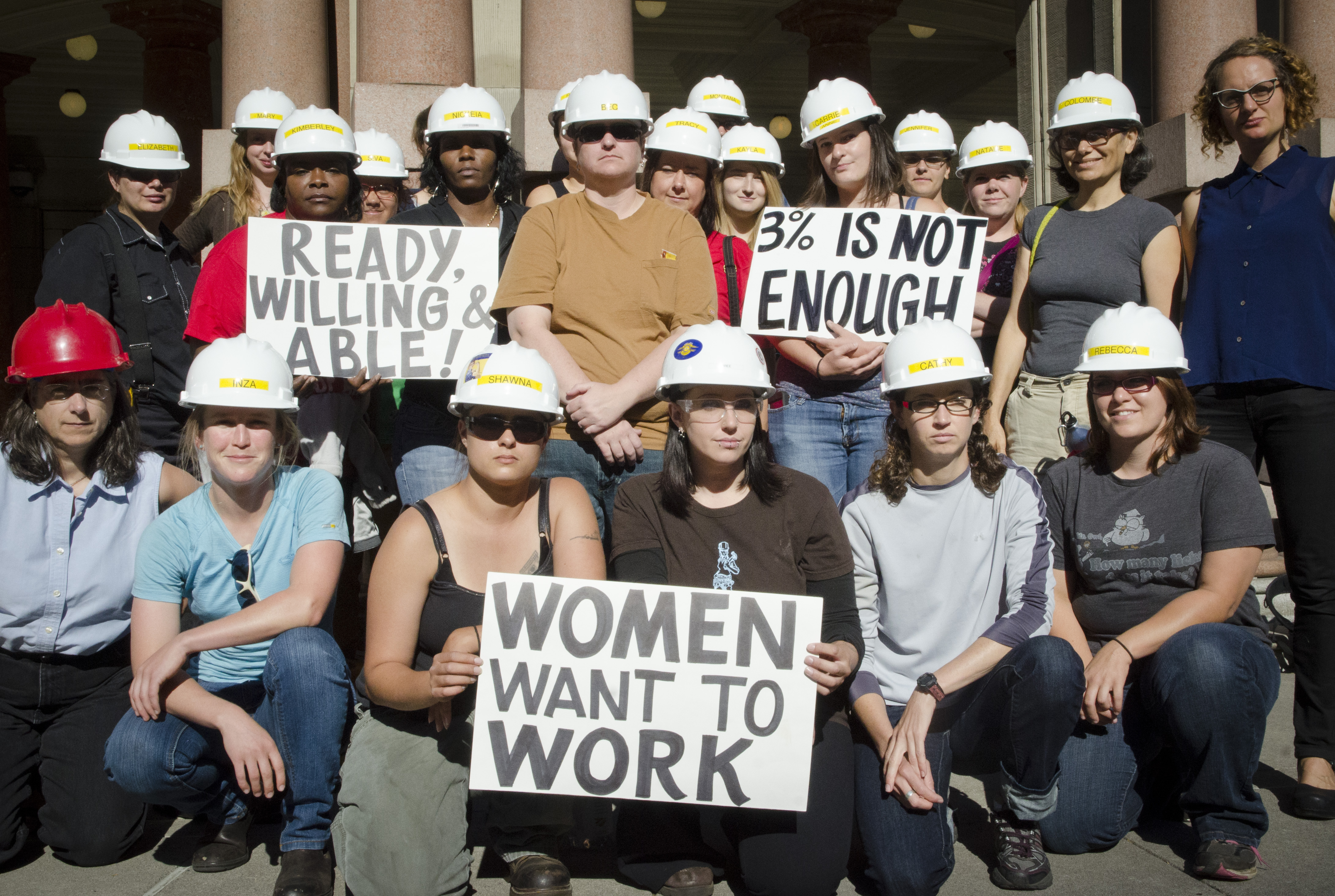
OTI is very grateful that the incredibly smart, Madelyn Elder is part of our team. Most recently, she was President of Communication Workers of America Local 7901 (CWA) and kept close tabs on the Trans Pacific Partnership (TPP). Madelyn gave us a quick rundown of the potential consequences of this trade deal.
Most of the points below are because a. there are no labor protections or environmental protections written into the language; and b. the ability for “foreign” partner corporations to sue the federal or state or local governments for “unfair” trade laws or advantages.
- “Foreign” firms in more countries would be given equal access to government contracts. Firms operating in any TPP signatory country would be given equal access to the vast majority of US federal procurement contracts. IE “Buy American” would be a thing of the distant past, as governments are required to accept the lowest bid.
- Prevailing Wage—this will be a thing of the past, as it is a peculiarly US law, and as such is subject to construction corporations in partner countries to sue the US Government. Without Prevailing Wage laws, the unionized contractors would be at a disadvantage in bidding for government building jobs, many of which require the lowest bid to be adopted.
- Union wages and benefits in general—with equal competition for construction corporations from other countries and the allowing of them to pay lower wages, the downward pressure on US labor contracts would be no mistake.
- Safety—Safety laws are different state to state in the US, although they must adhere to the minimum safety laws under the federal OSHA. Either state laws that are more strict and/or the federal OSHA laws are not protected under the TPP, therefore putting the states or Feds at risk of being sued for too stringent safety laws (just like environmental laws.) Construction is a very hazardous industry by its very nature, and required safety laws are just the minimum to prevent injury and death on the job.
- Portland’s $15/hr minimum wage, which would raise the wages of laborers on city contract jobs, would be at risk, as would paid medical leave at all levels of government.
- Project Labor Agreements: These would be off the table. PLAs are instrumental in getting a higher percentage of women and all people of color as workers and contractors hired for government-sponsored building projects. For example, Metro’s Zoo remodel has a PLA that secures a certain % of Minority owned and Women owned Business PLAs also guarantee prevailing wage and/or union-represented construction companies to bid. Enterprises that must be used. This would definitely be challenged by “foreign” corporations.
- Government-sponsored LEED (environmentally-sustainable) building, including tax incentives for private owners, etc. would be challenged. This, and environmental retrofitting, are two growth construction areas.
- Government funds for pre-apprenticeship and apprenticeship programs would be cut. These training programs are what standardize work, guarantee that workers understand and follow safety and other building codes, and assure the highest standards of how things are built (and don’t fall down.) There are now very few middle-class-wage jobs available to high school graduates since most manufacturing jobs left the US; apprenticeship programs are a foot-up for the next generation of workers.
Bottom line: All of the above US programs would be considered “unfair” advantages to trade in some way. Most of this information comes from the Communications Workers of America.
